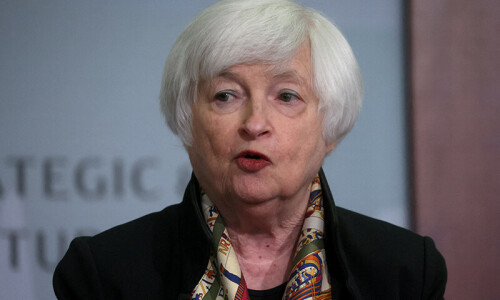WASHINGTON: The United States and India focused on regional terrorist threats, information sharing, border security and efforts to counter violent extremism at a meeting of their joint working group on counter-terrorism in Washington this week.
Justin Siberell, an acting coordinator for counter-terrorism, led the US delegation, which included officials from the Departments of State and Justice, as well as Homeland Security, at the talks in Washington.
Ravi Thapar, an additional secretary at India’s ministry of external affairs, led the Indian delegation.
The US-India Counter-terrorism Joint Working Group is a policy consultation forum designed to “advance the common agenda of the two countries and opportunities for cooperation across the full range of counter-terrorism issues”, a media note from the State Department said.
“The United States looks forward to continued counter-terrorism exchanges with India to broaden and deepen the partnership between the two countries,” the note added.
NON-MILITARY OPTIONS: Two US experts on South Asian affairs, George Perkovich and Toby Dalton, both associated with the Carnegie Endowment for International Peace, have advised India to go for “non-military options” to seek Pakistan’s cooperation in the fight against terrorism.
Mr Perkovich, who is vice president of the Washington think tank, and Mr Dalton, a co-director, argued in a joint essay published on Thursday that the “military options” India had used so far had not been very fruitful.
Reviewing the military options available to India, the two experts argued that the most “direct means of retribution” would involve operations by Indian armed forces.
Such options could include air strikes on alleged militant facilities inside Pakistan or even a ground incursion inside Pakistan.
The authors noted that India had been putting in place plans and capabilities —including the so-called ‘Cold Start’ option — to carry out such direct punitive actions.
Other options could involve using special operations forces or funding militant groups that attack the Pakistani state.
But the authors pointed out: “Thus far India’s development of punitive military options has not motivated Pakistani leaders to do more to stop such attacks from occurring.”
They warned that executing a limited military reprisal could satisfy the desire for punishment, but “risks triggering an escalating military conflict of profound cost and consequence.”
The authors argued that since the Pakistan Army was the only organisation capable of reining in militant groups, an attack on the military could further hurt the “war on terror”.
Instead, the authors suggested applying diplomatic and economic pressure on Pakistan to encourage it to cooperate. They claim that after the 2008 Mumbai terror attacks, India successfully used this option, causing the Pakistani economy to suffer.
“The value of the Pakistani rupee depreciated significantly, from 62 rupees per US dollar in Jan 2008 to a low of 108 rupees per dollar in Dec 2013. Total foreign direct investment declined significantly from $5.3 billion in FY 2008 to $820 million in FY 2012, and has remained low at $851 million in FY 2015 even after a rebound in the world economy,” the authors argue.
For seeking future cooperation from Pakistan, the authors suggest “marshalling diplomatic, economic, and social resources to build and sustain international pressure to force changes in its behaviour.”
If there’s another Pakistan-linked terrorist attack inside India, New Delhi could persuade its partners to postpone bilateral meetings with Pakistan or delay visa processing, the authors argue.
They also suggest highlighting anti-terrorism issues at the IMF to condition further financing for Pakistan on cracking down on terrorist groups that attack other states.
They also suggest seeking an advance commitment from the United States and other major powers to cut security assistance to Pakistan if there is another terrorist attack in India.
The authors say that while “the punitive benefits of this strategy may be less direct than military action, but they also come with far lower risks of an escalating conflict that could result in damage to India far greater than the instigating event”.
Published in Dawn, July 29th, 2016













































